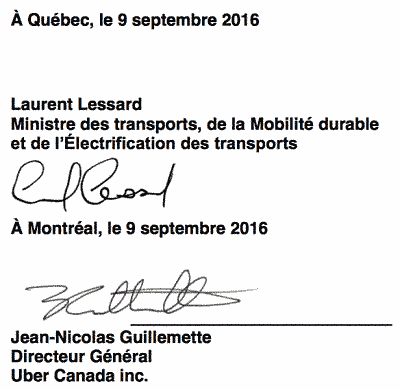In down-to-the-wire negotiations, Uber and Québec’s Transport Minister agreed to sweeping regulations that could provide other governments a blueprint for how to tax and regulate ride-hailing firms. You can tax Uber; you can regulate Uber; just don’t try to fingerprint their drivers.
 Under the province’s Bill 100, passed June 10, Uber and the Minister had 90 days to work out a longer-term agreement outlining the company’s operations. The pilot program expired at midnight September 9; the agreement, according to the CBC, was signed by both parties within minutes of the deadline.
Under the province’s Bill 100, passed June 10, Uber and the Minister had 90 days to work out a longer-term agreement outlining the company’s operations. The pilot program expired at midnight September 9; the agreement, according to the CBC, was signed by both parties within minutes of the deadline.
The plan calls for Uber to pay provincial taxes and additional per-ride fees. Drivers must obtain a chauffeur’s license and pass a third-party criminal background check. Importantly, the agreement makes no call for a fingerprint check of drivers.
Uber pulled out of Austin, Texas, after the city voted to require fingerprinting. Apparently Uber has a higher tolerance for taxes than it does fingerprints.
The Transportation Ministry has released the document. Here is a summary:
- The agreement lasts one year. It’s another pilot.
- Uber must obtain from the Québec Transport Commission a license to arrange transportation. Almost certainly fees will apply.
More Taxes and Fees
- Uber must negotiate a tax agreement with the Agency of Revenue Québec.
- Uber will pay a fee to the Province based on the number of driver-hours per week. The Ministry will provide the ‘equivalent’ of 300 taxi owner’s permits.
- From 0-50,000 hours per week, Uber will pay a $0.90 fee per ride. (50,000 equals the number of hours if 300 drivers were on the road 24/7 (300 drivers x 24 hours x 7 days=50,400 hours.).
- From 50,001-100,000 hours, Uber will pay $1.10 per ride—a 22% increase.
- From 100,001-150,000 per week, Uber will pay a $1.26 fee per ride—a 40% increase from the $0.90 fee.
- An additional fee of $0.07 per ride is described as in some way representing the insurance costs faced by taxi drivers.
Uber Drivers To Get Québec Chauffeur’s License
In a sweeping change of course, Uber drivers will have to obtain the same operator’s license (4C) as taxi drivers. To qualify, drivers must speak French and pass a test on area knowledge. The fees for a new license are a little over $26.
New Trade Dress Requirement
Drivers must display an Uber sign in the lower, right, front windshield.
Trades dress, the display of the company logo, is an important safety item that should be standard in all markets. Verifying the display of proper signage should be one of several steps riders take before entering a hailed car.
Montréal, however, is one of the few markets where this could cause as many problems as it prevents. The Montréal taxi industry has been aggressive and, at times, violent towards Uber drivers.
They aren’t shy about this violence, either. The video above was posted by a company that services the taxi industry.
When my wife and I took an Uber in Montréal this summer, the driver called out, “Front seat, front seat, please.”
Suspecting that this was to hide the fact that he drove for Uber, I asked him if this is because of trouble with taxi drivers. He said no in the most charming way. “The back seat is for passengers; the front seat is for friends.”
I almost thought I was in a Lyft, but they don’t operate in Québec. I didn’t totally believe him, either.
Other Regulations Are Standard Operating Procedure
- The minimum fare is $3.45.
- Drivers must have their cars properly registered with the province.
- The cars must pass a safety inspection.
- The drivers must have insurance.
- Uber drivers can’t pick up street hails. All bookings must take place through app.
Even with the new fees and regulations, Uber prices likely will undercut taxis in Montréal, except when they surge.
The new agreement also limits Uber’s surge pricing to 1.5 times the regular fare in times of natural disaster. So Uber won’t profit off the next Montréal earthquake. The last big quake was in 1732, so they just might be due.
For more information on the Québec taxi/ride-hailing scene, see my review of Montréal’s Téo Taxi.
